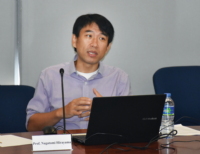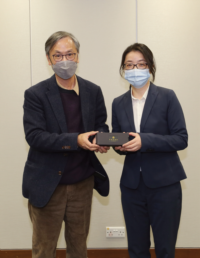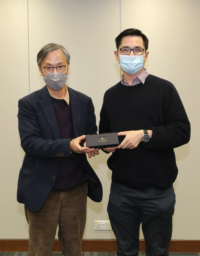Co-organised by the Centre for China Studies, the first seminar “The Unmaking of the Chinese Radical Right in WWII”was delivered by Prof. Nagatomi Hirayama from University of Nottingham Ningbo on 18 November 2021.,.
Prof. Hirayama is an Assistant Professor of modern Chinese history at the University of Nottingham Ningbo China. He is an intellectual and political historian studying in particular the formation and transformation of modern Chinese mass-party politics. His book, entitled The Making and Unmaking of the Chinese Radical Right, 1918–1951, is now in press at Cambridge University Press. His other publications previously appeared in Twentieth-Century China, Historical Research, and Frontiers of History in China.
The seminar was about the founding of the Chinese Youth Party (CYP) out of the Young China Association in both China and Europe, the CYP’s ideology and political movements, its military mobilisation in North China, and its successful local construction in Sichuan. Prof. Hirayama concluded his presentation with CYP’s 1940s deradicalisation and how the party turned into a civil opposition force.
The second seminar was held on 6 December 2021, delivered by Prof. Hye-shim Yi and Prof. Calvin Hui.
Prof. Hye-shim Yi is an Assistant Professor in School of Arts at Kent State University, USA. Her research interests are artisanal experience in late imperial China, materiality of calligraphy, cross-cultural interaction between China, Korea, and Japan. Her recent academic article in 2020, “From Epigraphy to Inscribing Objects: Recarving Ancient Relics into Inkstones”, appeared in Orientations.
Prof. Yi talked on the topic “The Knife Being Independent of the Brush: The Emergence of the Distinctive Aesthetics of Calligraphic Carving in the Middle Qing”. Focusing on the Zhe school in seal carving during the middle Qing, the lecture explored the relationship between brush writing and knife carving in the theories and practice of seal carving and identified the development of the distinctive aesthetics of calligraphic carving vis-à-vis those of brush-based calligraphy. Prof. Yi mentioned the chopping-knife method specifically, which is the signature carving method of the Zhe school.
Prof. Calvin Hui is a Class of 1952 Distinguished Associate Professor of Chinese Studies at College of William and Mary, USA. His research interests are modern Chinese humanities (film, media, and literature), cultural studies, and critical theory, with particular emphases on western Marxism, gender and sexuality studies, and postcolonial and transnational studies. His book, entitled The Art of Useless: Fashion, Media, and Consumer Culture in Contemporary China, was published by Columbia University Press in September 2021.
Prof. Hui spoke on the topic “‘Mao’s Children are Wearing Fashion!’: Romantic Love, Fashion Consumption, and the Politics of Socialist Modernisation in Huang Zumo’s Film Romance on Lu Mountain (1980)”. He talked about the depiction of the female character in Huang’s film and argued that her fashionable clothes could be regarded as a signifying symbol where the changing relationship between the libidinal and the political from the end of the Cultural Revolution to the beginning of China’s economic reforms. According to Prof. Hui, the political culture of revolution is replaced by the economic ideology of modernisation and development in the 1980s.
The active discussion in the Q&A session favoured the interactions between the audiences and the speakers. |















